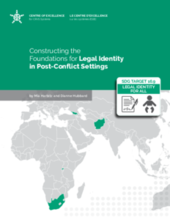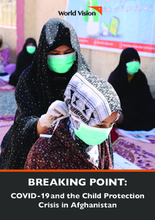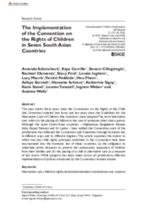Displaying 11 - 20 of 43
For years, specialists have been sounding the alarm about the dangers of collecting and failing to secure data on the world’s most vulnerable.
Months after the Taliban’s return in Afghanistan, there are grave concerns about the state of the country, and in particular, the lives of children.
The WHO South-East Asia Regional Office in collaboration with UNICEF organized a 3-day virtual meeting from 27 to 29 April, 2021.
"A steady stream of men have fled Afghanistan for Australia," says this article from SBS News, "but despite being recognised as refugees and granted protection, they have since faced never-ending visa delays for their wives and children to be able to join them. Some have now been waiting, alone, for more than 10 years."
This is a video recording from the webinar: Constructing the foundations for legal identity in post conflict situations. This webinar shared findings from research that documents how Afghanistan, Georgia, Rwanda and South Africa have made registration of vital events more accessible by adjusting or removing legal and institutional obstacles in post-conflict settings.
This paper aims to contribute to the achievement of Target 16.9 under Sustainable Development Goal 16 by analyzing the role of the civil register and the legal underpinnings for identity in four countries: Afghanistan, Georgia, Rwanda, and South Africa. It describes institutional and operational models in each country that support universal registration of births, deaths, and other vital events.
Key findings from this report demonstrate that due to the negative impact of the outbreak, the vulnerability of the households further increased and already existing dangerous coping strategies such as child labor, child marriage and decrease of food consumption have been worsened by financial insecurity for families and losses of household income.
This article examines the extent to which two key child rights principles enshrined in the Convention have been incorporated into the domestic law of seven South Asian countries: (a) the obligation to undertake active measures to prevent the unnecessary separation of children from their families and (b) the placing of a child in alternative care as a measure of last resort.
All over the world, the pandemic has turned children's lives upside down. In this episode of Save the Children Documentary, they share their stories.
This book largely focuses on unaccompanied minors who arrived in a European country in 2015, with special attention paid to the top-three nationalities of unaccompanied minors, namely Syrian, Afghan and Eritrean minors.



